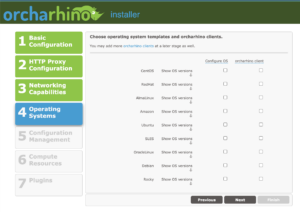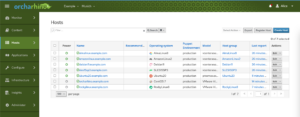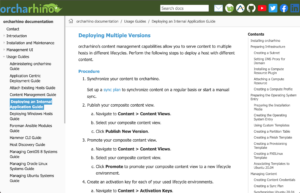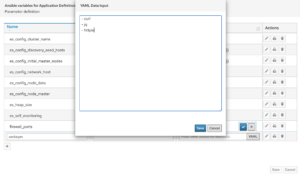Release Notes
Key Features
- Added Operating Systems as managed systems:
- Alma Linux 8
- Amazon Linux 2
- Debian 11 (“Bullseye”)
- Rocky Linux 8
- SLES 15 SP3
- ACD
- Import and export Application Definitions
- Edit Ansible group variables in orcharhino management UI of any type
- Salt minions can now be automatically registered during host installation
- Ansible runs can now be triggered using dry-run option as host parameter
- Host password: Indication by which entity a password for a host has been set when creating a new host
- Override
puppet_intervalusing a host parameter to run Puppet in different intervals for different hosts/host groups - Merge Ansible/Puppet/Salt variables of type json and yaml
Added katello-host-toolsandkatello-host-tools-tracerfor Debian/Ubuntu to notify orcharhino if hosts need reboot after package installation- Update Foreman Ansible Modules to 2.1.0
- New Kickstart files for Oracle Linux 7 for easy installation as orcharhino host operating system
- Documentation
- New Deploying an Internal Application Guide
- New Administering orcharhino Guide
- Reworked Managing Ubuntu Hosts guide with focus on offline installations
- New recomended Salt Minion authentication procedure using Salt Grains
- Reworked OpenSCAP Guide with focus on uploading SCAP content to orcharhino
- Clarified bootstrap.py requirements split by operating system
- Extended Remote Execution Features with focus on changing associated templates
- New installation instructions for VMware and Proxmox compute resource plugins
- Reworked orcharhino installation guide
Bug Fixes
- ACD: Application Definition Export does not contain playbook id
- ACD: Resource Type does not have a user friendly name
- AutoYaST orcharhino default template fails validation on SLES 15 SP3
- AutoYaST orcharhino default template fails validation on SLES 15 SP3 with static IP
- Bootstrap.py does not add sub-certificates as trusted certificate
- Parameter @host.salt_master is not available in safe mode rendering
- Proxy configuration is not set for Puppet
- Running salt.highstate via Schedule Remote Job fails
- SLES Bootdisk doesn’t support HTTP Proxy without DHCP
- Snapshot Manager ignores ‘include RAM’
- Suse_SCC-Account without name shows meaningless Error
- Terminal output for remote execution cut off after 10 lines
- downloading packages including ‘+’ characters from AmazonLinux2 repositories fails
- filtered task list shows wrong number of pages
- redhat repository sync gets stuck
Screenshots






